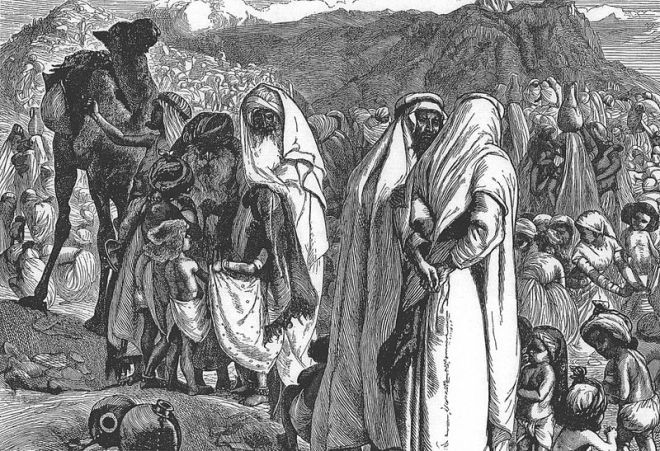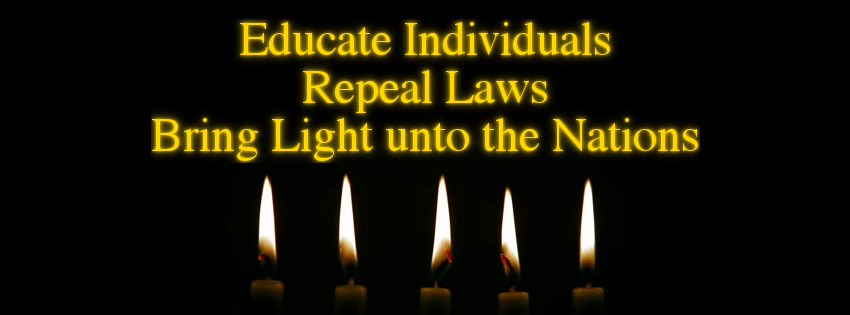This parashah, Matoth (Bemidbar/Numbers 30:2–32:42) is the penultimate parashah of Bemidbar and is sometimes combined with the subsequent one, Mase`ei. This is the story of the importance of spoken promises or vows, the attack against the Midianites, the disobedience by the soldiers to Moses, the cleansing after war, the inventorying of spoils, and the agreement that Gadites and Re’uvenites could settle east of the Jordan if they provided troops in war.

Reuben and Gad Ask for Land by Arthur Boyd Houghton
In this parashah, we learn the importance of making an oral promise or pledge and binding obligations, that is contract law. Contract law is the basis of any increasingly advanced society and is important to maintaining relations on a grander scale than a family or a village. When large amounts of people are involved, it is important to have a formal agreement.
Bemidbar 30:3
אִישׁ כִּי-יִדֹּר נֶדֶר לַיהוָה, אוֹ-הִשָּׁבַע שְׁבֻעָה לֶאְסֹר אִסָּר עַל-נַפְשׁוֹ–לֹא יַחֵל, דְּבָרוֹ: כְּכָל-הַיֹּצֵא מִפִּיו, יַעֲשֶׂה.
(Any) man who vows a vow to YHVH or swears a sworn-oath, to bind himself by a binding-obligation: he is not to desecrate his word, according to all that goes out of his mouth, he is to do.
Oral contracts are somewhat controversial. In order to ever be sure of something, it is always best to get it in writing. Speech can also be misinterpreted and misremembered. Writing is permanent, unless quantum mechanics wants to mess with us! However, there are times when an oral contract is the only thing possible or practical. In ancient times, writing was difficult and expensive, so oral contracts were common. It was imperative that they be followed thru and upheld. Once uttered, they were binding.
The Torah makes clear that one needs to remember when one makes a spoken promise and be careful about it. It cannot be taken back or changed. Again, while it is best to have things in writing, this is not always possible. Thus, we are to take care with our utterances and to uphold them.
Bemidbar 32:16-18, 23, 31-32
וַיִּגְּשׁוּ אֵלָיו וַיֹּאמְרוּ, גִּדְרֹת צֹאן נִבְנֶה לְמִקְנֵנוּ פֹּה, וְעָרִים, לְטַפֵּנוּ.
וַאֲנַחְנוּ נֵחָלֵץ חֻשִׁים, לִפְנֵי בְּנֵי יִשְׂרָאֵל, עַד אֲשֶׁר אִם-הֲבִיאֹנֻם, אֶל-מְקוֹמָם; וְיָשַׁב טַפֵּנוּ בְּעָרֵי הַמִּבְצָר, מִפְּנֵי יֹשְׁבֵי הָאָרֶץ.
לֹא נָשׁוּב, אֶל-בָּתֵּינוּ–עַד, הִתְנַחֵל בְּנֵי יִשְׂרָאֵל, אִישׁ, נַחֲלָתוֹ.
וְאִם-לֹא תַעֲשׂוּן כֵּן, הִנֵּה חֲטָאתֶם לַיהוָה; וּדְעוּ, חַטַּאתְכֶם, אֲשֶׁר תִּמְצָא, אֶתְכֶם.
וַיַּעֲנוּ בְנֵי-גָד וּבְנֵי רְאוּבֵן, לֵאמֹר: אֵת אֲשֶׁר דִּבֶּר יְהוָה אֶל-עֲבָדֶיךָ, כֵּן נַעֲשֶׂה.
נַחְנוּ נַעֲבֹר חֲלוּצִים לִפְנֵי יְהוָה, אֶרֶץ כְּנָעַן; וְאִתָּנוּ אֲחֻזַּת נַחֲלָתֵנוּ, מֵעֵבֶר לַיַּרְדֵּן.
They came close to him and said: Sheep fences we will build, for our livestock here, and towns for our little-ones; and as for us, we shall be drafted hastily before the Children of Israel, until we have brought them to their region. But our little-ones will stay in towns fortified against the inhabitants of the land. We will not return to our houses until the Children of Israel have inherited each-man his inheritance.
But if you do not do thus: here: you will have sinned against YHVH, and know your sin-that (it) will overtake you!
The Sons of Gad and the Sons of Re’uven answered, saying: What YHVH has spoken to your servants, thus will we do: we ourselves will cross over, as drafted men, before YHVH, into the land of Canaan, (remaining) with us (will be) our inherited holding, across the Jordan.
Here, we see an example of an oral contract when the Gadites and the Re’evenites wanted to settle east of the Jordan River, in contravention to Gods promise of the land of Israel (this means the border is meant to be the river). Moshe relented and agreed they could settle there if they promised to help conquer and defend the land for the other tribes. In a small family, it is easy to make an agreement or just do what needs to be done. In a large group like the Children of Israel, consisting of hundreds of thousands of people, it is important to negotiate detailed agreements. This is exactly what Moshe and the two tribes did. They hammered out the details and made it fair to both sides.
Moshe also understood the importance of self-determination. The Gadites and Re’uvenites really wanted to settle east of the River and he was not in much of a position to oppose them. They had every right to decide they wanted to settle there and even offered the agreement to placate his designs. He knew that he could not force his goals on everyone and that if he tried, he risked splitting up the tribes into separate nations. This was to be avoided at all costs.
Agreements are important in a growing society and often they will be made by word of mouth. Not everyone can afford a scribe, nor is it always necessary to hire one for a minor agreement. However, it is still important to uphold all agreements in order to have a fair and just society. Because memory of speech is far from perfect, it is imperative that people are careful about their promises and be sure to uphold and honor them. Failure to do so is a sin against God.

Reblogged this on Marc Firestone.